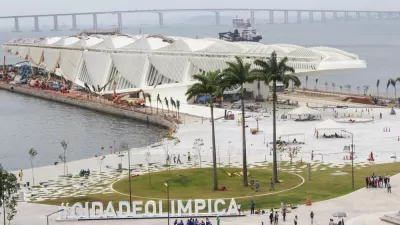As the world turned its attention Sunday from London to Rio, host of the next Summer Olympics, Theresa Williamson and Mauricio Hora penned an op-ed for The New York Times arguing how the city's preparations are threatening its history.
Rio's first hillside favela - Morro da Providência - more than a century old and "one of the most important cultural sites in Afro-Brazilian history", was recognized recently with inclusion, alongside a substantial portion of the city, on Unesco's list of World Heritage Sites. However, according to Williamson and Hora, city officials are failing to recognize the site's historical importance in their Olympic construction plans, as "almost a third of the community is to be razed, a move
that will inevitably destabilize what's left of it."
"Although the city claims that investments will benefit residents, 30
percent of the community's population has already been marked for
removal and the only 'public meetings' held were to warn residents of
their fate."
"If Rio succeeds in disfiguring and dismantling its most historic favela," Williamson and Hora argue,
"the path will be open to further destruction throughout the city's
hundreds of others."
"The economic, social and psychological impacts of
evictions are dire: families moved into isolated units where they lose
access to the enormous economic and social benefits of community
cooperation, proximity to work and existing social networks - not to
mention generations' worth of investments made in their homes."
FULL STORY: In the Name of the Future, Rio Is Destroying Its Past

Maui's Vacation Rental Debate Turns Ugly
Verbal attacks, misinformation campaigns and fistfights plague a high-stakes debate to convert thousands of vacation rentals into long-term housing.

Planetizen Federal Action Tracker
A weekly monitor of how Trump’s orders and actions are impacting planners and planning in America.

In Urban Planning, AI Prompting Could be the New Design Thinking
Creativity has long been key to great urban design. What if we see AI as our new creative partner?

King County Supportive Housing Program Offers Hope for Unhoused Residents
The county is taking a ‘Housing First’ approach that prioritizes getting people into housing, then offering wraparound supportive services.

Researchers Use AI to Get Clearer Picture of US Housing
Analysts are using artificial intelligence to supercharge their research by allowing them to comb through data faster. Though these AI tools can be error prone, they save time and housing researchers are optimistic about the future.

Making Shared Micromobility More Inclusive
Cities and shared mobility system operators can do more to include people with disabilities in planning and operations, per a new report.
Urban Design for Planners 1: Software Tools
This six-course series explores essential urban design concepts using open source software and equips planners with the tools they need to participate fully in the urban design process.
Planning for Universal Design
Learn the tools for implementing Universal Design in planning regulations.
planning NEXT
Appalachian Highlands Housing Partners
Mpact (founded as Rail~Volution)
City of Camden Redevelopment Agency
City of Astoria
City of Portland
City of Laramie



























